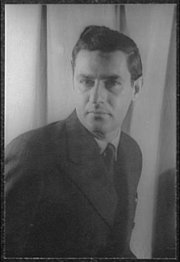 |
 |
|
 |
The
Genesis of Amahl and This is an opera for children because it tries to recapture my own childhood. You see, when I was a child I lived in Italy, and in Italy we have no Santa Claus. I suppose that Santa Claus is much too busy with American children to be able to handle Italian children as well! Our gifts were brought to us by the Three Kings, instead. I actually never met the Three Kings—it didn’t matter how hard my little brother and I tried to keep awake at night to catch a glimpse of the Three Royal Visitors, we would always fall asleep just before they arrived. But I do remember hearing them. I actually never met the Three Kings—it didn’t matter how hard my little brother and I tried to keep awake at night to catch a glimpse of the Three Royal Visitors, I actually |
|
never met the Three Kings—it didn’t matter how hard my little brother and I tried to keep awake at night to catch a glimpse of the Three Royal Visitors, we would always fall asleep just before they arrived. But I do remember hearing them. I remember the weird cadence of their song in the dark distance; I remember the brittle sound of the camel’s hooves crushing the frozen snow; and I remember the mysterious tingling of their silver bridles. My favorite king was King Melchior, because he was the oldest and had a long white beard. My brother’s favorite was King Kaspar. He insisted that this king was a little crazy and quite deaf. I don’t know why he was so positive about his being deaf. I suspect it was because dear King Kaspar never brought him all the gifts he requested. He was also rather puzzled by the fact that King Kaspar carried the myrrh, which appeared to him as a rather eccentric gift, for he never quite understood what the word meant. To these Three Kings I mainly owe the happy Christmas seasons of my childhood and I should have remained very grateful to them. Instead, I came to America and soon forgot all about them for here at Christmas time one sees so many Santa Clauses scattered all over town. Then there is the big Christmas tree in Rockefeller Plaza, the elaborate toy windows on Fifth Avenue, the one hundred voice choir in Grand Central Station, the innumerable Christmas carols on radio and television and all these things made me forget the three dear old Kings of my own childhood. But in 1951 I found myself in serious difficulty. I had been commissioned by the National Broadcasting Company to write an opera for television, with Christmas as a deadline, and I simply didn’t have one idea in my head. One November afternoon as I was walking rather gloomily through the rooms of the Metropolitan Museum, I chanced to stop in front of the Adoration of the Kings by Hieronymus Bosch. And as I was looking at it, suddenly I heard again, coming from the distant blue hills, the weird song of the Three Kings. I then realized they had come back to me and had brought me a gift. I am often asked how I went about writing an opera for television, and what are the specific problems that I had to face in planning a work for such a medium. I must confess that in writing “Amahl and the Night Visitors”, I hardly thought of television at all. As a matter of fact, all my operas are originally conceived for an ideal stage which has no equivalent in reality, and I believe that such is the case with most dramatic authors. For the creator, the moment of nightmare in a dramatic work occurs when he finally sees his idea frozen in the realistic frame of the theatre. Something infinitely precious to the author is altered when the original poetic impulse has been translated into literal and visual terms, no matter how excellent they may be. When realized in the theatre, the work becomes suddenly a disassociated and detached entity in front of which he finds himself almost a stranger. That mysterious moment of vision has been made wonderfully and fatally concrete. I’m sure that to very young people the stage must appear histrionically primitive compared to the cinema and television. But to me the stage still comes the closest to the “ideal theatre”, perhaps because of its greater use of symbolism, imposed by its own limitations, demands of the audience a wider range of imagination and a deeper poetic sense. To me, cinema, television, and radio seem rather pale substitutes for the magic of the stage. This is the reason why, in writing “Amahl and the Night Visitors”, I intentionally disregarded the mobility of the screen and limited myself to the symbolic simplicity of the stage. The spectator who takes no journey and has no appointed time or seat but, carelessly clad, sits casually on the first available chair in his living room, and who, knitting or perhaps playing with the kitten, “turns on” what he takes to be a theatrical performance, will never know the emotion of a real theatrical experience. The theatre must be a choice—a carefully made appointment. Machiavelli, even after he retired to the county, used to don his most elaborate and richest clothes before setting to work on his books. Symbolically, at least, every artist does the same. He addresses you in utter dignity—whether his message be comic or tragic—and to partake in his experience, you must share this seriousness and receive his message wearing your “Sunday clothes”. No harm is done by indulging in “mechanical boxes,” nor am I trying to discourage you from listening to this recording. As a matter of fact, listening to an opera on records is a bit like courting a girl by correspondence; it has its advantages and disadvantages. The advantages are considerable. Being unable to see the girl you are courting, you can allow your imagination to soar and lend to your loved one every sort of physical charm she may not possess in reality. The disadvantages are mainly physical ones and much too obvious to enumerate. Now if the girl happens to be one of those ungainly, cold, intellectual individuals who write well, love at a distance is highly recommendable. But if the girl is a warm, passionate and beguiling creature, love of the flesh and blood is definitely preferable. As it happens, my operas are not cold, intellectual creatures: they are rather nice to look at, impulsive, and warm hearted, too warm hearted at times, so it seems. Although you may enjoy listening to their voices through a speaker, if you are to know them well, I still recommend that you should spend an evening with them at the theatre. Gian Carlo Menotti |
|

